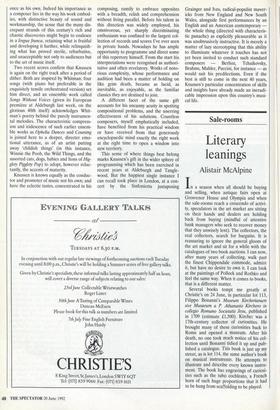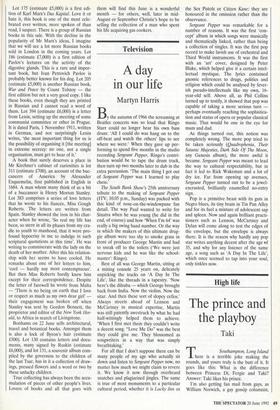Sale-rooms
Literary leanings
Alistair McAlpine
In a season when all should be buying and selling, when antique fairs open at Grosvenor House and Olympia and when the sale-rooms reach a crescendo of activi- ty, speculators in the art market are sitting on their hands and dealers are holding back from buying (mindful of attentive bank managers who seek to recover money that they unwisely lent). The collectors, the real collectors, search for bargains. It is reassuring to ignore the general gloom of the art market and sit for a while with the catalogues of two book auctions. I can now, after many years of collecting, walk past the finest Chippendale commode, admire it, but have no desire to own it. I can look at the paintings of Pollock and Rothko and feel the same way. When it comes to books, that is a different matter.
Several books tempt me greatly at Christie's on 24 June, in particular lot 113, Filippo Bonanni's Museum Kircherianum sive Musaeum a P. Athanasio Kirchero in collegio Romano Societatis Jesu, published in 1709 (estimate 1.1,500). Kirchei was a 17th-century collector of curiosities. He brought many of these curiosities back to Rome and opened a museum. After his death, no one took much notice of his col- lection until Bonanni tidied it up and pub- lished a catalogue. This book is just up my street, as is lot 114, the same author's book on musical instruments. He attempts to illustrate and describe every known instru- ment. The book has engravings of curiosi- ties such as the tubo cochleato, a French horn of such huge proportions that it had to be hung from scaffolding to be played.
Lot 175 (estimate £5,000) is a first edi- tion of Karl Marx's Das Kapital, Love it or hate it, this book is one of the most cele- brated ever written, more spoken of than read, I suspect. There is a group of Russian books in this sale. With the decline in the popularity of Mr Marx's ideas, I imagine that we will see a lot more Russian books sold in London in the coming years. Lot 186 (estimate £7,000) is a first edition of Pavlov's lectures on the activity of the digestive glands. This is a rare and impor- tant book, but Ivan Petrovich Pavlov is probably better known for his dog. Lot 205 (estimate £5,000) is another Russian book, War and Peace by Count Tolstoy — the first edition but not a very good copy. I like these books, even though they are printed in Russian and I cannot read a word of them. Lot 394 (estimate £6,000) is a letter from Lenin, setting up the meeting of some communist committee or other in Prague. It is dated Paris, 1 November 1911, written in German, and not surprisingly Lenin writes, 'the most important thing for us is the possibility of organising it [the meeting] in extreme secrecy: no one, not a single organisation, must get to hear of it.'
A book that surely deserves a place in Mr Kirchner's cabinet of curiosities is lot 311 (estimate £700), an account of the buc- caneers of America by Alexander Exquemelin, first published in English in 1684. A man whom many think of as a bit of a buccaneer is Henry Morton Stanley. Lot 383 comprises a series of love letters that he wrote to his fiancée, Miss Gough Roberts. The letters are written from Spain. Stanley showed the iron in his char- acter when he wrote, `So real my life has been, so stern in all its phases from my cra- dle to youth to manhood, that it were pro- found hypocrisy in me to indulge in such scriptural quotations at this time'. He was writing to commiserate with the lady on the death of her mother. After this his relation- ship with her seems to have cooled. He remarks about one of her letters to him, `cool — hardly nay most contemptuous'. But then Miss Roberts hardly knew him except for their correspondence. Despite the letter of farewell he wrote from Malta — `There is no being on earth that I love or respect as much as my own dear girl' — their engagement was broken off when Stanley was sent by Gordon Bennett, the proprietor and editor of the New York Her- ald, to Africa in search of Livingstone.
Bonhams on 22 June sells architectural, travel and botanical books. Amongst them is also a lock of Byron's hair (estimate £500). Lot 130 contains letters and docu- ments, many signed by Ruskin (estimate £6,000), and lot 131, a souvenir album com- piled by the governess to the children of the last Tsar, has in it a collection of draw- ings, pressed flowers and a word or two by these unlucky children.
True collecting has always been the accu- mulation of pieces of other people's lives. Lovers of books and all that goes with them will find this June is a wonderful month — for others, well, later in mid- August or September Christie's hope to be selling the collection of a man who spent his life acquiring gas cookers.



























































 Previous page
Previous page